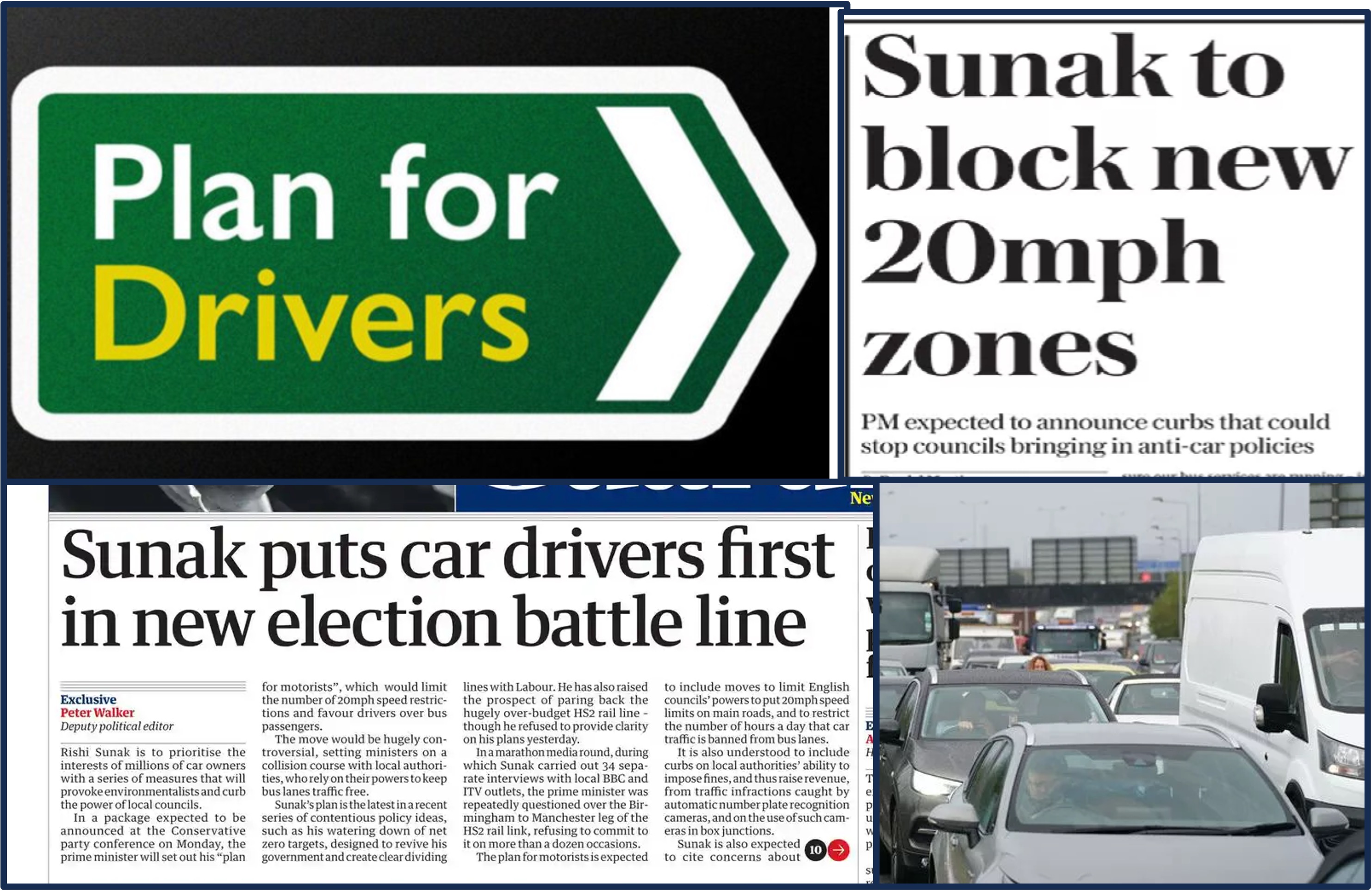This is blog No 45
The strange thing about the Plan for Drivers is that I actually found something in it with which I agreed ...
... having felt sorely aggrieved a few years ago whilst caught in an apparently 24-hour bus lane late one Nottingham evening, without sight nor sound of a bus within miles! Local Councils may be discouraged for abuses like this. Hooray.

Everything else seems so absurd. Professor Glenn Lyons, Vice-President of the Chartered Institute of Highways and Transport (CIHT) says “The Plan for Drivers may fuel a culture war but it does little to support decarbonisation and sustainable transport.” That puts it mildly. Very little has inspired the planning profession, climate conscious academics, policy-makers, and supporters of net zero into such frenzy of indignant objection.
If the aim of Ministers was to provoke the wokerati (See my Blog in April on the liberal elite) in the hope that most voters would disagree with it, they may have succeeded brilliantly. Its language is all about ‘protecting’ motorists from all manner of aggressive policies – few real and mostly imagined
Setting personal views aside, however, there is an interesting feature of this exercise – the sheer number of new consultations it announces! Here they are:-
- Whether motorcycles should have access to Bus Lanes.
- Obliging local authorities with Lane rental schemes to use at least 50% of any surplus on pothole repairs or resurfacing.
- Extending fines for overrunning street works at weekends.
- Removal of Council access to DVLA data for enforcing ‘15-minute cities’.
- Revised guidance on the public right to challenge Council parking policies.
- Removal of rights to compensation for property damage by uninsured drivers.
- Speeding up approval processes for EV chargepoints.
- Use permitted development rights to ease the installation of private chargepoints.
So, is this the hallmark of a Government wholly committed to regular and meaningful consultation with stakeholders? Hardly. If recent conduct and U-turns are anything to go by, this is not really what characterises the Sunak administration. I rather think this avalanche of consultation tells us something different.
Here are Ministers who think they’ve dreamt up a wonderful and unexpected new wheeze to persuade people to vote for them. Buoyed up by the Conservatives’ by-election performance at Uxbridge, they think they detect widespread dissatisfaction with the way roads are managed, motorists are treated and how air quality restrictions and net zero will affect them.
But they are not absolutely sure. They look at the polls that show high levels of public acceptance for net zero policies and feel a little awkward trying to deny everything that Cameron, May, and Boris Johnson told them over the years.
Consultation is a way they can hedge their bets … just a little. Far from being the smack of firm government, it betrays weakness and uncertainty. They want the benefit of brandishing the rhetoric without the disadvantage of having to defend the detailed specifics. Consultation also buys them time – they can exploit the aggressive messaging before an Election, knowing that real changes could only happen afterwards.
It would be easy to condemn such behaviour as an abuse of consultation. Yet in a real sense, this is one of its great virtues. It enables kite-flying; it can expose half-baked ideas to scrutiny. It enables real experts to participate and avoid being by-passed.
As is often the case with contentious knee-jerk policies, there are some legitimate underlying issues. Here, it is the whole concept of ‘local consent’ and how we conduct effective and sensitive dialogues over changes that impact the lives of citizens. The Labour Party will soon encounter the dilemmas inherent in these matters if it intends to push through its Say yes to Building houses approach. In the meantime, skirmishes over Low Traffic Neighbourhoods (LTNs) low emission zones and speed limits provide are harbinger of things to come and a foretaste of the problems we will need to address.
So, strangely, a paper occasioned by many of the worst political motives and full of deceptions, exaggerations and distortions may yet prove useful and help us tackle important emerging issues.
Leave a Comment
I hope you enjoyed this post. If you would like to, please leave a comment below.